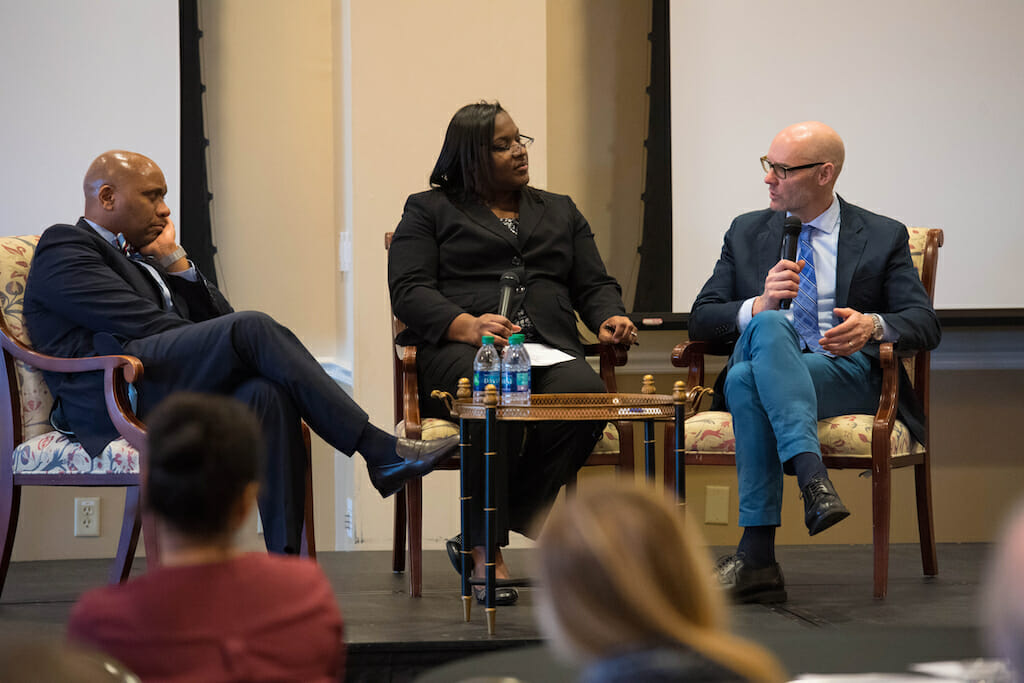
A professor from the University of Michigan and an administrator from the University of Missouri spoke to about 200 people who attended the university’s inaugural Diversity Summit at The Inn at Ole Miss. Themed “Making the Case for Diversity,” the event was sponsored by the Division of Diversity and Community Engagement.
“The purpose of this summit is to provide an open discussion addressing the benefits of diversity and inclusion for organizations,” said Katrina Caldwell, vice chancellor for diversity and community engagement and moderator of the proceedings. “Our guest speakers are here to address contemporary issues in higher education, while Mrs. (Shawnboda) Mead (director of the UM Center for Inclusion and Cross Cultural Engagement) is facilitating a community conversation about our campus climate.”
Following a welcome from Chancellor Jeffrey Vitter and opening remarks by Donald Cole, assistant provost and associate professor of mathematics, the first guest speaker delivered his keynote address on “Diversity Bonuses.”
“We need diversity,” said Scott E. Page, Leonid Hurwicz Collegiate Professor of Complex Systems, Political Science and Economics at the University of Michigan. “There is no trade-off between excellence and diversity.
“Scientific data shows that if you combine people who think in different ways about the world, you get more bonuses than you would by combining people who all share the same global perspectives.”
Citing numerous scientific studies during his presentation, Page said that while diversity has proven to make institutions better, it doesn’t happen naturally or without intentional effort.
“Not every approach will work at every place,” he said. “Stakeholders must determine what the environment of their organization is and what unique changes need to take place where they are.”
Diverse groups of random individuals tend to be more creative than homogenous ones with selected individuals, Page said.
“The measure of individual creativity is how many different ideas can you come up with,” he said. “The measure of group creativity is how many ideas do you have that no one else does.”
Kevin McDonald, vice chancellor of inclusion, diversity and equity at Missouri, shared successful diversity case studies from his own experiences and others.
“There is a business case for diversity,” McDonald said. “To achieve goals, you must have a strategy and follow a process.
“Depending upon how engaged the stakeholders are, the process will either yield deep change at the infrastructural level or superficial results that amount to little, if any, progress.”
McDonald noted that recruitment and retention practices are interdependent upon one another.
“Community engagement is needed, so meet with leaders from all sectors and allow them to get involved,” McDonald said. “Be collaborative. Share resources. Work together.”
Page, McDonald and Mead then engaged in a panel discussion, answering questions asked by members of the audience. Mead conducted a closing session on the cultural climate of the Ole Miss campus.
“Diversity is all of us,” she said. “While race has been and remains a central part of our efforts toward inclusion, we must broaden our definition of diversity in order to have more meaningful and productive conversations.”
The university has made progress in diversity, but still has a ways to go before it will be a truly multicultural/inclusive organization, Mead said.
“The challenge is for each of us to use our expertise, caring and professionalism to support campus faculty, staff and students who might need it,” Mead said. “We’re all capable and we’re all responsible for it. Our first instinct must always be, ‘I can do this.’
“We’re all able to make a positive difference for those whose identities at times feel marginalized and isolated from the rest of the university community.”
By Edwin B. Smith
